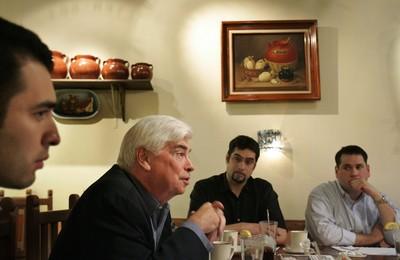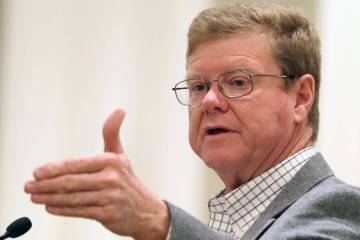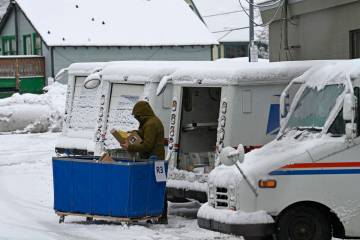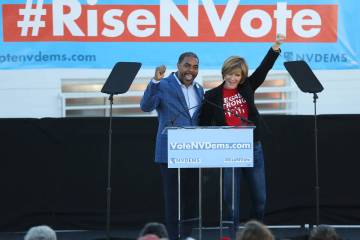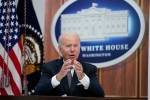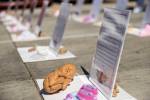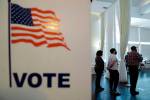Dodd makes connection with Hispanics
Alonso Flores wanted to know whether he could address Chris Dodd in Spanish.
"Sure," said the Connecticut senator who is seeking the Democratic nomination for president.
Flores, a Las Vegas-based board member of the Institute of Mexicans Abroad, launched into an impassioned appeal, telling Dodd of the large number of Hispanics in Nevada's workforce, most of them Mexican, and expressing his group's desire for presidential candidates who will speak to the Hispanic community.
"We love this country. We want this country to be strong," Flores said, summarizing his remarks in English later. "We are preparing our community to vote in this election, not just in Nevada but across the country. We need more than just words, we need actions from the presidential candidates."
As Flores was addressing him in Spanish, Dodd was nodding, occasionally interjecting, "Si, claro." He answered the man in fluent Spanish.
Dodd was at the Lindo Michoacan Mexican restaurant in Las Vegas on Saturday morning in an attempt to convince some prominent Nevada Hispanics that he speaks their language, not just literally but also politically. At a table of 10 people at the back of the restaurant, Dodd conversed informally with Hispanic academics, businesspeople and activists, hoping to hear their concerns at the same time as he explained his own views.
Nevada's large Hispanic population, estimated at about 30 percent of the state's 2.5 million people, was a major reason the state was picked by the Democratic National Committee to move its presidential nominating caucus up to January 2008, between the contests in Iowa and New Hampshire.
Those traditional early nominating states have populations that are more than 90 percent white. But the presidential candidates will have to address a more diverse crowd when they come to Nevada, a test the Democrats hope will produce a nominee better able to face America as a whole in the general election next year.
"As far as the early states go, Nevada's the place for the candidates to talk to the Hispanic community," said Assemblyman Mo Denis, D-Las Vegas, who attended Saturday's powwow with Dodd. Hispanic participation in elections, he said, "is something that has started, and it's going to continue to build and build. Our numbers are growing every year."
Candidates campaigning in Nevada, he said, "will have to focus on our needs in our community in meetings like this. I don't know if you can win (the presidency) outright with just the Hispanic vote, but I think you will lose without it."
Just how much of a role Hispanic voters will play in the 2008 race isn't known. In past presidential elections, Hispanic voter turnout has been low compared with that of other ethnic groups.
Both parties have courted Hispanics, but Democrats of late have tried aggressively to capitalize on Hispanics' opposition to Republican immigration proposals in Congress. In the 2006 elections, about 70 percent of Hispanics voted for Democrats, according to research by the Pew Hispanic Center.
In Nevada, Denis and Assemblyman Ruben Kihuen, D-Las Vegas, are the only Hispanics in the 63-member Legislature. Dodd remarked on the low level of political representation for the state's large Hispanic population, to which Kihuen, introducing the senator to the group, said, "We're a new community. We're working on it."
Kihuen praised Dodd for being the first candidate to meet specifically with the Hispanic community in Nevada.
Dodd learned Spanish in his early 20s when he spent two years with the Peace Corps in a remote mountain village in the Dominican Republic. It is not his only tie to Latin America, he noted: His oldest brother, a professor of Latin American history, spent eight years as U.S. ambassador to Costa Rica and Uruguay.
"I may be Irish, but my heart is Latino," Dodd said in Spanish.
Dodd said he hoped to restore America's standing in the eyes of other nations, including those in Latin America. "How saddened I was to see an American president traveling in Latin America a few weeks ago who basically had to hide because he couldn't be seen in public," Dodd said. "While I believe people are disappointed in this (Bush) administration, I don't think it's irreversible."
On immigration, Dodd said it was important for Congress to act on the issue quickly before it could be distorted by electoral posturing. He called for increased penalties for employers of illegal immigrants, strengthening the Southern border in partnership with the Mexican government and provisions to allow those in the United States illegally to become legal residents.
Dodd said he was not against a guest-worker program but believed such an initiative should be limited in scope. He praised President Bush, of whom he was otherwise sharply critical, for taking moderate stances on immigration that have been unpopular with many in his own party.
"I have a lot of disagreements with George Bush, but my sense is on this question that he wants to do more right than wrong," Dodd said. "It's a far better direction than (CNN's) Lou Dobbs, (Rep. Tom) Tancredo and (former Rep. J.D.) Hayworth."
One questioner said many Hispanics were impatient with Congress' inaction on immigration.
"Democrats now have a majority in both houses of Congress," said Rene Cantu, the vice president for multicultural affairs at Nevada State College. "When they were in the minority, we always heard, 'Once we're in the majority, we'll do something about immigration.' Now we're wondering why it still has not happened."
Dodd said he didn't know exactly what the status of immigration legislation was but that he had assurances that Senate Majority Leader Harry Reid, D-Nev., was working on the issue, trying to make sure the Democrats, with their razor-thin one-vote majority, had enough bipartisan support to get legislation passed.
Dodd said he believed it would be a mistake to separate larger immigration reform legislation from the Development, Relief and Education for Alien Minors, or DREAM, Act, which aims to help illegal immigrants brought to the United States as children. Immigration reform as a whole has a better chance of passing if it is linked to the sympathetic cause of helping children, he said.
Asked about education, Dodd said he favored more federal funding for schools, tied to voluntary national standards.
"The goals of No Child Left Behind are essential, but the implementation has been a disaster," he said.
At the end of the question-and-answer session, Dodd asked those assembled for their help and support. Lindo Michoacan's owner, Javier Barajas, who owns several restaurants and other businesses as well as a children's foundation, told the candidate he could come back anytime.
"Thank you for being the first future president to be in my restaurant," Barajas said.



